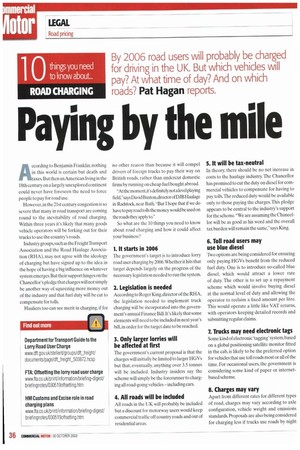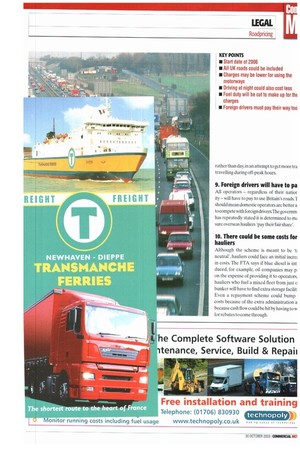Paying by the mile
Page 36

Page 37

If you've noticed an error in this article please click here to report it so we can fix it.
By 2006 road users will probably be charged for driving in the UK. But which vehicles will pay? At what time of day? And on which
roads? Pat Hagan reports.
According to Benjamin Franklin. nothing in this world is certain but death and taxes But then anAmerican living in the 18th century on a largely unexplored continent could never have foreseen the need to force people to pay for road use.
However, in the 21st century congestion is so severe that many in road transport are coming round to the inevitability of road charging. Within three years it's likely that many goods vehicle operators will be forking out for their trucks to use the country's roads.
Industry gyoups,such as the FreightTransport Association and the Road Haulage Association (RHA), may not agree with the ideology of charging but have signed up to the idea in the hope of having a big influence on whatever system emerges But their support hinges on the Chancellor's pledge that charges will not simply be another way of squeezing more money out of the industry and that fuel duty will be cut to compensate for tolls.
Hauliers too can see merit in charging, if for no other reason than because it will compel drivers of foreign trucks to pay their way on British roads, rather than undercut domestic firms by running on cheap fuel bought abroad.
"At the moment s definitely not a level playing field,"says David Buxton,director of DJB1Haulage in Radstock.near Bath."But I hope that if we do have to pay road tolls the money would be used on the roads they apply to."
So what are the 10 things you need to know about road charging and how it could affect your business?
1. It starts in 2006 The government's target is to introduce lorry road user charging by 2006.Whether it hits that target depends largely on the progress of the necessary legislation needed to run the system.
2. Legislation is needed
According to Roger King.director of the RHA, the legislation needed to implement truck charging will be incorporated into the government's annual Finance Bill. It's likely that some elements will need to be included in next year's bill, in order for the target date to be reached.
3. Only larger lorries will be affected at first
The government's current proposal is that the charges will initially be limited to larger HGVs but that, eventually, anything over 3.5 tonnes will be included, industry insiders say the scheme will simply be the forerunner to charging all road-going vehicles including cars.
4. All roads will be included
All roads in the UK will probably be included but a discount for motorway users would keep commercial traffic off country roads and out of residential areas. 5. It will be tax-neutral In theory, there should be no net increase in costs to the haulage industry. The Chancellor has promised to cut the duty on diesel for commercial vehicles to compensate for having to pay tollsThe reduced duty would be available only to those paying the charges. This pledge appears to be central to the industry's support for the scheme.-We are assuming the Chancellor will be as good as his word and the overall tax burden will remain the same," says King.
6. Toll road users may use blue diesel
Two options are being considered for ensuring only paying HGVs benefit from the reduced fuel duty. One is to introduce so-called blue diesel, which would attract a lower rate of duty The other is to set up a repayment scheme which would involve buying diesel at the normal level of duty and allowing the operator to reclaim a fixed amount per litre. This would operate a little like VAT returns, with operators keeping detailed records and submitting regular claims.
7. Trucks may need electronic tags
Some kind of electronic 'tagging' system,based on a global positioning satellite monitor fitted in the cab, is likely to be the preferred option for vehicles that use toll roads most or all of the tune. For occasional users, the government is considering some kind of paper or internetbased scheme.
8. Charges may vary
Apart from different rates for different types of road, charges may vary according to axle configuration, vehicle weight and emissions standards. Proposals are also being considered for charging less if trucks use roads by night rather than day, in an attempt to get more tra travelling during off-peak hours.
9. Foreign drivers will have to pa All operators — regardless of their natior ity — will have to pay to use Britain's roads.1 should mean domestic operators are better a to compete with foreign dri veralhe goverrun has repeatedly stated it is determined to Mk sure overseas hauliers 'pay their fair share'.
10. There could be some costs for hau hers Although the scheme is meant to be neutral', hauliers could face an initial incre; in costs. The 1FTA says if blue diesel is int. duced, for example, oil companies may p. on the expense of providing it to operators, hauliers who fuel a mixed fleet from just o bunker will have to find extra storage faciliti Even a repayment scheme could bump costs because of the extra administration a because cash flow could be hit by having tow for rebates to come through.




























































































































































































